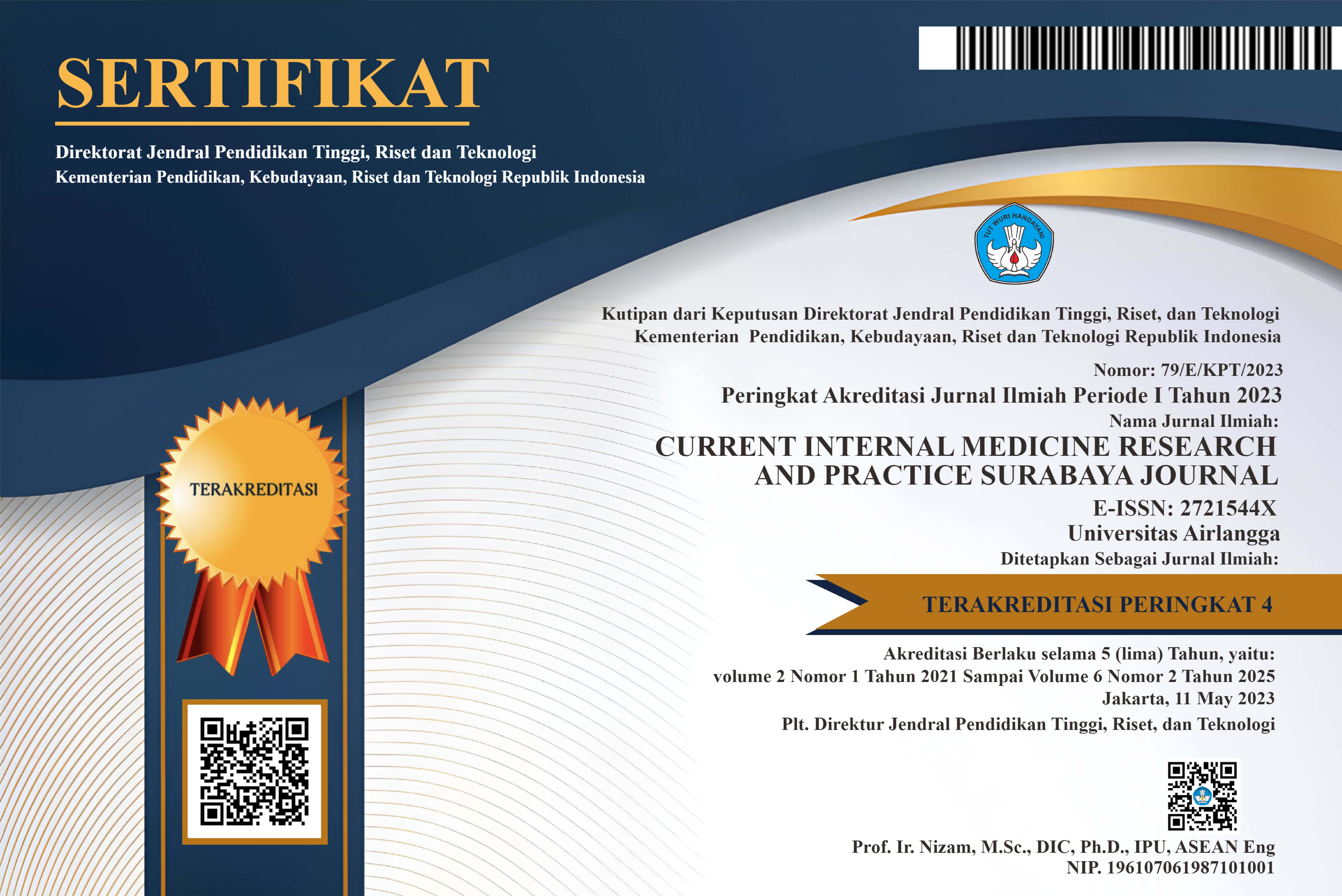Diagnosis and Management of Autoimmune Hemolytic Anemia in Systemic Lupus Erythematosus
Downloads
Autoimmune hemolytic anemia (AIHA) may indicate the first manifestation of systemic lupus erythematosus (SLE). It is estimated that the incidence of AIHA is around 10% in patients with SLE. The first-line therapy for AIHA is corticosteroids. Nevertheless, a second-line therapy may be considered if an adequate response is not obtained. Transfusion indication in AIHA patients do not differ from other types of anemia. These indications include the degree of hemolysis, the progression of anemia, and clinical symptoms. However, blood transfusion for AIHA patients is challenging due to the limited availability of serologically compatible blood. In addition, AIHA patients who receive transfusions have an increased risk of experiencing hemolytic transfusion reactions. In this paper, we aimed to present a case report on the diagnosis of AIHA in an SLE patient treated with second-line therapy and red blood cell transfusions. The patient was a 49-year-old woman who presented with the main complaint of swelling in both legs. According to the medical history, the patient experienced petechia, abdominal distension, body weakness, and weight gain. No reports of joint pain, diarrhea, constipation, fever, shortness of breath, or yellowish skin were made. Before being referred to Dr. Soetomo General Academic Hospital in Surabaya, Indonesia, the patient experienced high blood pressure and body swelling that were unresponsive to treatment. Once the diagnosis of AIHA was confirmed, the patient was set to receive second-line therapy and red blood cell transfusions. At the conclusion of the therapy, the patient exhibited favorable outcomes.
Highlights:
1. This paper presents the management of autoimmune hemolytic anemia in systemic lupus erythematosus, which has been understudied in Indonesia.
2. This paper provides additional evidence regarding the indications and outcomes of red blood cell transfusion in a case of autoimmune hemolytic anemia.
Ameer MA, Chaudhry H, Mushtaq J, Khan OS, Babar M, et al. (2022). An overview of systemic lupus erythematosus (SLE) pathogenesis, classification, and management. Cureus. doi: 10.7759/cureus.30330.
Andriastuti M, Ritchie NK, Kosasih KA, Muhammad F, Fathinasari AD, et al. (2022). Red blood cell transfusion for pediatric autoimmune hemolytic anemia in an emergency situation. eJournal Kedokteran Indonesia 9(3): 230–235. doi: 10.23886/ejki.9.19.230-5.
Barber MRW, Drenkard C, Falasinnu T, Hoi A, Mak A, et al. (2021). Global epidemiology of systemic lupus erythematosus. Nature Reviews Rheumatology 17(9): 515–532. doi: 10.1038/s41584-021-00668-1.
Barcellini W, Fattizzo B (2015). Clinical applications of hemolytic markers in the differential diagnosis and management of hemolytic anemia. Disease Markers 2015: 1–7. doi: 10.1155/2015/635670.
Barcellini W, Zaninoni A, Giannotta JA, Fattizzo B (2020). New insights in autoimmune hemolytic anemia: From pathogenesis to therapy. Journal of Clinical Medicine 9(12): 3859. doi: 10.3390/jcm9123859.
Barros M, Langhi Jr D, Bordin JO (2017). Autoimmune hemolytic anemia: Transfusion challenges and solutions. International Journal of Clinical Transfusion Medicine Volume 5: 9–18. doi: 10.2147/IJCTM.S81870.
Cappellini MD, Motta I (2015). Anemia in clinical practice—Definition and classification: Does hemoglobin change with aging? Seminars in Hematology 52(4): 261–269. doi: 10.1053/j.seminhematol.2015.07.006.
Chaudhary R, Das S (2014). Autoimmune hemolytic anemia: From lab to bedside. Asian Journal of Transfusion Science 8(1): 5. doi: 10.4103/0973-6247.126681.
Chen C, Wang L, Han B, Qin L, Ying B (2020). Autoimmune hemolytic anemia in hospitalized patients. Medicine 99(2): e18739. doi: 10.1097/MD.0000000000018739.
Das S, Zaman R, Safi M (2014). Incompatible blood transfusion: Challenging yet lifesaving in the management of acute severe autoimmune hemolytic anemia. Asian Journal of Transfusion Science 8(2): 105. doi: 10.4103/0973-6247.137445.
Deng J, Zhou F, Wong CY, Zheng E, Huang E (2021). Transfusion of modified blood components for the treatment of autoimmune hemolytic anemia: A network meta-analysis. Future Rare Diseases 1(1). doi: 10.2217/frd-2020-0006.
Durcan L, O’Dwyer T, Petri M (2019). Management strategies and future directions for systemic lupus erythematosus in adults. The Lancet 393(10188): 2332–2343. doi: 10.1016/S0140-6736(19)30237-5.
Fava A, Petri M (2019). Systemic lupus erythematosus: Diagnosis and clinical management. Journal of Autoimmunity 96: 1–13. doi: 10.1016/j.jaut.2018.11.001.
Firestein GS, Budd RC, Gabriel SE, McInnes IB, O’Dell JR (2020). Firestein & Kelley’s textbook of rheumatology. (G. Koretzky, Ed.). Elsevier, 11th ed. Retrieved from https://books.google.co.id/books/about/Firestein_Kelley_s_Textbook_of_Rheumatol.html?id=LGbvDwAAQBAJ&redir_esc=y.
Gondal B, Aronsohn A (2016). A systematic approach to patients with jaundice. Seminars in Interventional Radiology 33(04): 253–258. doi: 10.1055/s-0036-1592331.
Hill A, Hill QA (2018). Autoimmune hemolytic anemia. Hematology 2018(1): 382–389. doi: 10.1182/asheducation-2018.1.382.
Hill QA, Hill A, Berentsen S (2019). Defining autoimmune hemolytic anemia: A systematic review of the terminology used for diagnosis and treatment. Blood Advances 3(12): 1897–1906. doi: 10.1182/bloodadvances.2019000036.
Irawaty I, Rachmawati A, Arif M (2018). Characteristics of crossmatch types in compatibility testing on diagnosis and blood types using gel method. Indonesian Journal of Clinical Pathology and Medical Laboratory 23(1): 36–41. doi: 10.24293/ijcpml.v23i1.1182.
Jameson JL, Fauci AS, Kasper DL, Hauser SL, Longo DL, et al. (Eds.) (2018). Harrison’s principles of internal medicine. McGraw-Hill Education, 20th ed. Retrieved from https://accessmedicine.mhmedical.com/content.aspx?bookid=2129§ionid=159213747.
Kokoris S, Kalantzis D, Moschandreou D, Papaioannou K, Grouzi E (2022). Panagglutination on the indirect antiglobulin test... this is the challenge! Asian Journal of Transfusion Science 16(2): 257. doi: 10.4103/ajts.ajts_133_20.
Ministry of Health of the Republic of Indonesia (2015). Regulation of the Minister of Health of the Republic of Indonesia Number 91 of 2015 Concerning Standards for Blood Transfusion Services. Retrieved from http://hukor.kemkes.go.id/uploads/produk_hukum/PMK_No._91_ttg_Standar_Transfusi_Pelayanan_Darah_.pdf.
Mo HY, Wei JCC, Chen XH, Chen HH (2021). Increased risk of systemic lupus erythematosus in patients with autoimmune haemolytic anaemia: A nationwide population-based cohort study. Annals of the Rheumatic Diseases 80(3): 403–404. doi: 10.1136/annrheumdis-2020-218886.
Park SH (2016). Diagnosis and treatment of autoimmune hemolytic anemia: Classic approach and recent advances. Blood Research 51(2): 69. doi: 10.5045/br.2016.51.2.69.
Santacruz JC, Mantilla MJ, Rueda I, Pulido S, Rodriguez-Salas G, et al. (2022). A practical perspective of the hematologic manifestations of systemic lupus erythematosus. Cureus. doi: 10.7759/cureus.22938.
Sumariyono, Kalim H, Setyohadi B, Hidayat R, Najirman, et al. (2019). Diagnosis dan pengelolaan lupus eritematosus sistemik. Indonesian Rheumatology Association. Retrieved from https://reumatologi.or.id/diagnosis-dan-pengelolaan-lupus-eritematosus-sistemik/.
Copyright (c) 2024 Mega Kahdina, Cahyo Wibisono Nugroho

This work is licensed under a Creative Commons Attribution-ShareAlike 4.0 International License.
Copyright (c) Author
1. The journal allows the author to hold the copyright of the article without restrictions.
2. The journal allows the author(s) to retain publishing rights without restrictions.
3. The formal legal aspect of journal publication accessibility refers to Creative Commons Atribution-Share Alike 4.0 (CC BY-SA).






















